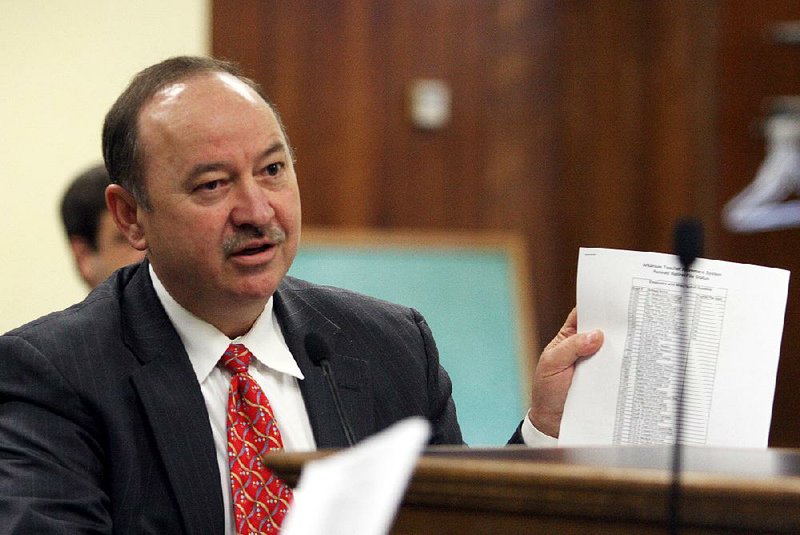The Arkansas Teacher Retirement System will guarantee a $150 million loan and interest owed by Highland Pellets LLC, which operates a wood-pellet manufacturing plant in the Pine Bluff industrial park near White Hall, the system's trustees decided Friday.
In exchange for the loan guarantee, the system will get a $15 million guarantee premium, said system Executive Director George Hopkins.
In July 2016, the trustees authorized an investment of up to $25 million for 31 percent equity ownership of Highland Pellets LLC. In September 2017, the trustees OK'd a $26 million loan to the company.
The company's other owners include Boston-based Highland Pellets Ltd.; Taylor and Lunsford Land and Timber Co. Profit Sharing Plan and Trust of Sheridan; David Lunsford of Sheridan; Bobby Taylor of Sheridan; and Shelby Taylor Trucking Inc. of Sheridan, Hopkins said after the trustees' meeting. Highland Pellets has 67.75 percent equity ownership of the firm with the retirement system having 31 percent, and the other named shareholders own 1.25 percent, Hopkins said.
The plant employs about 100 people, said Rod Graves, associate director of operations for the retirement system.
The Arkansas Teacher Retirement System is state government's largest such system with about $17 billion in assets and more than 100,000 working and retired members.
Global Infrastructure Partners of New York provided the initial money for developing the plant and construction, and the loan is the senior secured note for the project, the system's staff said in a written report to the system's board of trustees. The loan was intended for financing through the construction and commissioning phases of the plant and those phases are winding down, but the commissioning has taken longer than initially expected from the original projections, the staff report said.
The original projections and loan timelines put Global Infrastructure Partners in a position in the near future of requiring the equipment vendor, Astec of Chattanooga, Tenn., to pay the loan if certain date targets are not met. Those older agreements have put undue pressure on Astec, Global Infrastructure Partners and the investors, including the Teacher Retirement System, according to the system's staff report.
"Negotiations have been underway for several weeks in order to eliminate the pressure the 'put back' provision in the loan agreement has placed into the deal that jeopardizes the alignment of the interest and the success of the plant," the report said. "The desire of all parties to eliminate an unanticipated disruption due to longer than anticipated commissioning has provided ATRS an opportunity to be well compensated for undertaking the purchase/guarantee of a GIP loan that in all likelihood will be refinanced in less than 9 months.
"This would eliminate the obligation that would be undertaken to obtain the $15 million dollar purchase agreement fee," the report said.
The wood-pellet manufacturing plant is in the final stages of being completed and production levels have been about 70 percent of the expected final rates. More recent information shows production in the 90 percent to 95 percent range in recent days, according to the system's report.
Highland had anticipated and planned to maintain its existing financing through Global Infrastructure Partners until later this year and is already engaged in refinancing negotiations with new lenders, the report said.
The refinancing of the debt presents investment opportunities for the Teacher Retirement System, and "the catch point between the equipment vendor [Astec] and GIP has the equipment vendor ready to step up to provide capital to the Highland project totaling $68 million," the system's report said.
According to the report, the $68 million from Astec would be used for:
• Financing the $15 million premium that the retirement system would receive to backstop the $150 million loan, plus interest.
• Funding the reduction of the $150 million loan, plus interest, obligation by about $20 million. That would reduce that obligation from $160 million to about $140 million, Hopkins said.
• Paying down $15 million of the Teacher Retirement system's $26 million loan to Highland.
• Providing $10 million to complete all plant modifications recommended by Mid-South Engineering of Hot Springs to ensure the plant hits and maintains production at 100 percent of "nameplate capacity."
Hopkins said that, if the system is called upon to pay the loan for any reason, Global Infrastructure Partners will assign the promissory note and all the security interest in the collateral to the system.
"Importantly, the enhanced debt service fund that Highland will put in place will serve the loan payments to prevent a default, even at the older production levels, which are now being exceeded," he said.
"In a worst-case scenario there will be a plant that has $240 million of hard assets of ground that we have $165 million in and .... it should well exceed that price under any circumstance and we also have management highly motivated to refinance this note with a year," Hopkins said.
In other business, the trustees also approved investing up to $30 million in Thomas Bravo Fund XIII, a private equity buyout fund that invests in software companies.
Founded in 2007 and based in both Chicago and San Francisco, Thomas Bravo is an experienced manager that acquires software companies in the United States, according to the system's staff report to the trustees.
The firm will primarily seek investment opportunities in the application, infrastructure and security software industries with a secondary focus on technology-enabled service industries, the report said.
A Section on 07/21/2018
